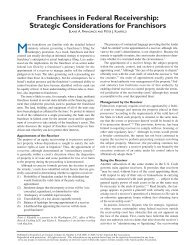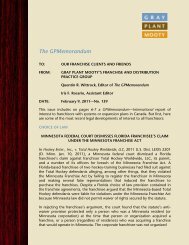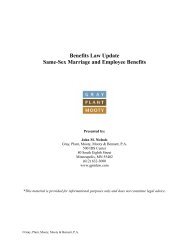Los Angeles Lawyer October 2008 - Gray Plant Mooty
Los Angeles Lawyer October 2008 - Gray Plant Mooty
Los Angeles Lawyer October 2008 - Gray Plant Mooty
You also want an ePaper? Increase the reach of your titles
YUMPU automatically turns print PDFs into web optimized ePapers that Google loves.
sexuality (and same-sex unions) is alive and<br />
well in California. Just weeks after the marriage<br />
decision, a November <strong>2008</strong> ballot initiative<br />
was approved to amend the California<br />
Constitution to define marriage as “between<br />
a man and a woman.” 29 This initiative seeks<br />
to revive Proposition 22, a ballot initiative that<br />
defined marriage as between a man and a<br />
woman and that passed in 2000 with 61 percent<br />
of the vote. Although In re Marriage<br />
Cases did not contain any express reference<br />
to overturning Proposition 22, it implies that<br />
it is unconstitutional. 30<br />
The legalization of same-sex marriage in<br />
California is expected to have several very<br />
positive side effects for California. A recent<br />
UCLA study estimates that the rush of gay<br />
weddings will create about 2,200 jobs, as<br />
nearly 50,000 of California’s same-sex couples<br />
will get married over the next three years,<br />
and 68,000 out-of-state same-sex couples<br />
travel to California to hold their nuptials. 31<br />
What does this mean for California and its<br />
economy? The numbers are significant: an<br />
estimated $684 million spent on various wedding<br />
services for gay marriages, an additional<br />
$64 million in tax revenue to the state, and<br />
approximately $9 million in marriage license<br />
fees for counties. 32<br />
Employer Concerns<br />
In re Marriage Cases can change things in the<br />
workplace. One such divide exists even in the<br />
ranks of those whose business is marriage—<br />
county clerks. In San Diego County, the<br />
county clerk has reassigned county employees<br />
who have expressed “sincerely held religious<br />
objections” to same-sex marriage so<br />
that they are not required to perform duties<br />
such as issuing marriage licenses, officiating<br />
over civil unions, or acting as a witness. 33 As<br />
the basis for this decision, the county clerk<br />
relied on the antidiscrimination provisions of<br />
Government Code Section 12940(l) (part of<br />
the California Fair Employment and Housing<br />
Act, more commonly known as FEHA),<br />
which requires an employer to “explore[]<br />
any available reasonable alternative means of<br />
accommodating the [employee’s] religious<br />
belief or observance and any employment<br />
requirement…including the possibilities of<br />
excusing the [employee] from those duties<br />
that conflict with his or her religious belief<br />
or observance or permitting those duties to<br />
be performed at another time by another<br />
person.” 34<br />
Not all county clerks are permitting<br />
employees to opt out of their duties as they<br />
relate to same-sex marriage, despite the fact<br />
that this FEHA provision and Title VII (the<br />
federal antidiscrimination provision) conceivably<br />
afford an opposing employee a right<br />
to obtain such an accommodation. In a recent<br />
survey, 35 of the state’s 58 counties indicated<br />
they either are not permitting clerks to opt out<br />
or their staff is objection-free. 35 In Alameda<br />
County, a reprieve is afforded to an objecting<br />
employee who produces a letter from his or<br />
her church. 36 While county clerk recorders<br />
may be refusing to accommodate employees<br />
on the basis that the county will not “make<br />
accommodations for someone to practice<br />
illegal discrimination,” 37 it is possible that the<br />
hard-line position these counties are taking<br />
regarding dissenting employees who do not<br />
want to administer same-sex ceremonies and<br />
duties might not withstand a legal claim for<br />
religious discrimination under the FEHA or<br />
Title VII.<br />
Beyond the relatively narrow sector of<br />
county clerks who issue marriage licenses,<br />
the legalization of same-sex marriages raises<br />
practical, day-to-day concerns and questions<br />
in the workplace that require thought by<br />
employers to ensure that no company executive,<br />
manager, or employee’s personally held<br />
beliefs or actions are conveyed in the workplace<br />
in a manner that could diminish morale,<br />
or worse, subject an employer to a potential<br />
claim under California’s antidiscrimination<br />
laws.<br />
First, employers may remember the adage<br />
that a picture says a thousand words. An<br />
employer with a practice of announcing<br />
employee weddings and circulating newlywed<br />
photos should strongly consider maintaining<br />
this practice and publishing corresponding<br />
announcements for its same-sex<br />
couples. This will serve to show the employer’s<br />
acceptance of the law and its recognition<br />
of same-sex unions as equal to a traditional<br />
marriage, as well as the company’s willingness<br />
to follow the law in the workplace. Of<br />
course, an employee request not to have his<br />
or her union or marriage publicized should<br />
be honored by an employer, regardless of<br />
whether it involves a same-sex or oppositesex<br />
couple.<br />
Second, employers should consider granting<br />
honeymoon time. For many same-sex<br />
couples who have been living in committed<br />
relationships, the attainment of this fundamental<br />
right to marry is long overdue. An<br />
employer should make every effort to accommodate<br />
an employee request for vacation<br />
time to schedule or attend a same-sex wedding,<br />
whether it is that employee’s wedding<br />
or the wedding of another, 38 being careful to<br />
ensure that its effort to accommodate the<br />
employee request is what it would be if the<br />
employee were seeking time off for a heterosexual<br />
wedding.<br />
Third, employers may want to cool the<br />
conversations. While it is not possible or<br />
even reasonable to expect to be able to prevent<br />
or stop all rumors, insensitive or politically<br />
incorrect comments, and awkward<br />
foot-in-mouth moments between employees<br />
at work, educating employees to be sensitive<br />
and curb personal conversations at work,<br />
particularly within earshot of other coworkers<br />
who may take offense, will aid in fostering<br />
a positive work environment.<br />
Employers should remember that even<br />
<strong>Los</strong> <strong>Angeles</strong> <strong>Lawyer</strong> <strong>October</strong> <strong>2008</strong> 21







